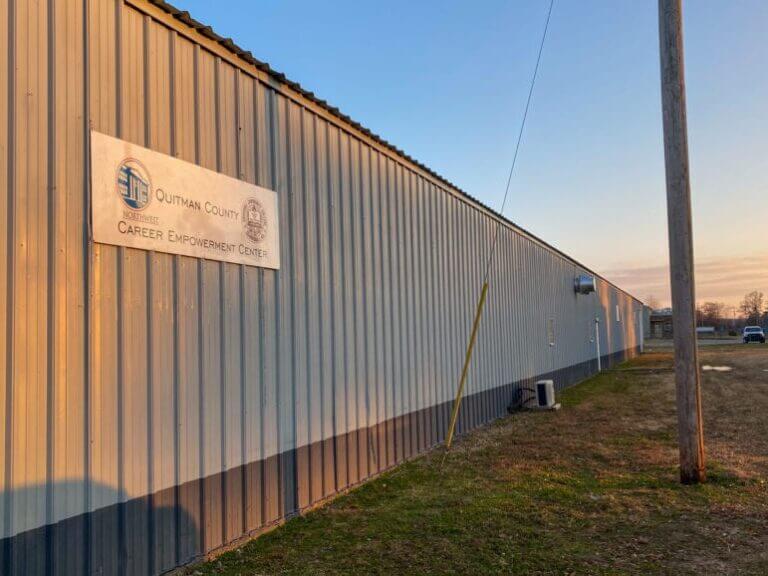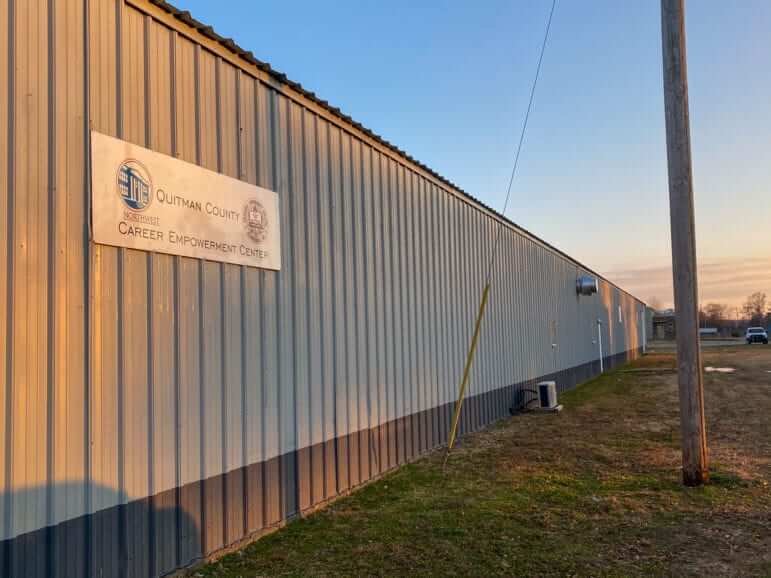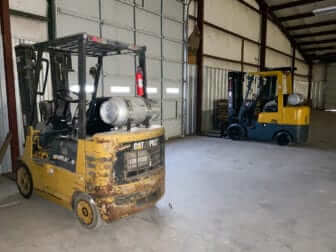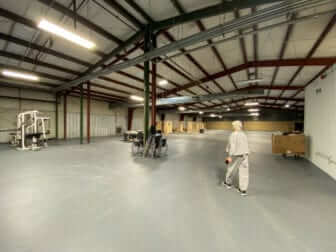

Aallyah Wright, Mississippi Today
The Career Empowerment Center in Marks, Miss.
MARKS — Dennis Washington, an 11-year custodian and bus driver for the Tunica County School District, has long aspired to become an electrician as a way to make additional income. For a few months now, the 50-year-old Tunica native has searched for online certification classes.
Not long into his search, his wife learned of an opportunity: a six-to eight-week residential electrical wiring class in Marks. It was free, so he applied.
“I would’ve had to pay for (the online class). I found this and by the grace of God, I got in it. I get hands-on experience. It saved me a lot of time and a lot of money,” Washington told Mississippi Today in a phone call. “I took the class because I have a son who is an electrician. I told him now I’ll be able to help him out. It motivated me to get it done.”
This “hands-on experience” is a part of the Career Empowerment Center, a job training program for people 18 and older in Quitman County and neighboring counties.

Aallyah Wright, Mississippi Today
Forklifts at the center in Marks, Miss.
The program is run by the Marks Project — a nonprofit organization focused on empowering residents with resources, skills, and education — in partnership with Coahoma Community College and Northwest Mississippi Community College.
Founded in 2018, the goal of the Marks Project is to eradicate poverty through education, recreation, quality of life employment and job training. In Quitman County where the organization is located, the median household income is $25,283, according to U.S. Census data.
Launched in 2019, the program offers training in residential electrical wiring, welding, forklift operating, screen printing, report writing, basic computer skills, and GED prep. Both community colleges offer classes for the project and each class is required to have at least five students. It is housed in a 24,000 square foot building owned by Quitman County.
Steven Jossell, executive director of Coahoma Community College Workforce Development Center, said the mission is to address the needs and demands of industry, and the center is a proponent for workforce development. This is why Coahoma provided a welding class.
“Welding is one of the most lucrative, skilled vocations in the country with a median entry-level wage in excess of $40,0000 annually,” Jossell said in an email.
The American Welding Society recently projected a shortage of 400,000 welders by 2024. As a result of this shortage, Jossell said the welding industry will have numerous employment opportunities for people “desiring to enter the vocation.”
Since the inception of the empowerment center, nearly 200 people have been trained, though it is unclear the total number of students who have gotten jobs.
“I think it really goes above and beyond and keeps a person (in their hometown),” said Wylie Lavender, advanced workforce trainer at Coahoma Community College Workforce Development Center. “Oftentimes, people are homebodies and hate to relocate … but we’ve had people gon’ up to Olive Branch and have got jobs.”
These jobs range from $14 to $19 an hour, Lavender said.
Lavender teaches a four-hour forklift class that includes OSHA and safety guidelines at the center. After the student completes the class, they receive a certification and a three-year license in forklift operation.

Aallyah Wright, Mississippi Today
Judy Bland, director of the Marks Project, tours the facility.
The center halted operations for six months due to the coronavirus pandemic and major renovations to cooling and heating systems. Its doors reopened in October.
Until last year, the Marks Project’s efforts focused primarily on youth. For example, the organization helped build a playground and reopened a fitness center. The organization also partnered with Quitman County, Northwest and Coahoma colleges on a job readiness and GED program, and secured tutoring, ACT Prep, and Jump Start program in the Quitman County School District.
Mitch Campbell, co-founder of the Marks Project, said the Career Empowerment Center is an extension of their work.
“We had two ladies that went through our screen printing program. They set up their own businesses. One of the ladies told the class, ‘You’ve just received $1,000 worth of free training on how to do screen printing.’ She got it,” Campbell said. “People are coming forward. They want to support their family. They want a better opportunity … the goal is to hopefully bring something that sticks in Marks.”
Campbell said a lot of this wouldn’t be possible without the tireless work of Bland, the Marks Project director. Bland, 76, handles coordination of partners, daily operations, activities, bookkeeping, and a host of other responsibilities.
After her retirement, she wanted to give more to her community.
“I like it here and I just want to be able to help people have a good standard of life,” Bland said. “This allows more people to work. If people could get trained and get jobs (as welders and electricians), they’re probably gonna make more money than I made teaching school.”
It took a collaborative effort byway of nonprofit, colleges and universities, and local government to push these initiatives forward, she added. The challenge, though, has been getting more community members involved, attracting more resources and funding.
“It’s a community project. We’ve got to have community involvement. It’s just not going to work if we don’t get parents and teachers and students involved in this,” Robert Mehrle, board member for the Marks Project. “Then it’ll help the community and we’ve got to get people to stay.”
In spite of this, the important factor is creating change for people like Washington, the custodian and bus driver in Tunica County. This is why the group’s leaders plan to expand programming from birth through adulthood.
“It’s been a wonderful experience so far,” said Washington. “(Last year) I took a class at Coahoma and did plumbing. Now I’ll have a certificate in electrical wiring.”
The post How a Delta nonprofit and local community colleges are teaming up to provide free job training appeared first on Mississippi Today.
- Maybe competition can be good for Mississippi public schools, or at least for teacher pay - February 8, 2026
- Brad Arnold, lead singer of Mississippi-formed rock band 3 Doors Down, dies at 47 - February 7, 2026
- People in 15 counties can receive replacement SNAP benefits without application - February 6, 2026